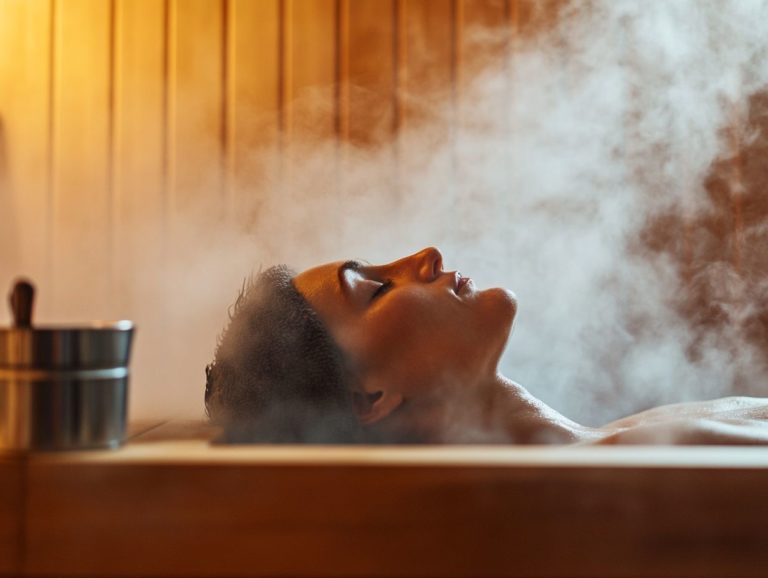Sauna Safety: Different Perspectives on Risks
Saunas are frequently praised for their many health benefits, ranging from promoting relaxation to helping your body recover.
However, using a sauna isn t without its risks, especially concerning heat exposure and hydration.
As you explore the benefits and potential drawbacks of sauna use, it s essential to consider expert opinions and varying views on safety protocols.
Let’s explore some practical tips to enjoy saunas safely!
Contents
- Key Takeaways:
- The Benefits of Saunas
- Potential Risks of Saunas
- Different Perspectives on Sauna Safety
- Practicing Sauna Safety
- Your Sauna Safety Questions Answered!
- 1. What safety risks should I be aware of when using a sauna?
- 2. Are there any differences in safety concerns between traditional and infrared saunas?
- 3. Can children use a sauna safely?
- 4. What are some precautions I can take to ensure a safe sauna experience?
- 5. Are there any medical conditions that make using a sauna unsafe?
- 6. Is it safe to use a sauna alone?
Key Takeaways:

The Benefits of Saunas
Saunas, whether you prefer the soothing warmth of an infrared sauna or the classic charm of a traditional one, are celebrated for their wealth of health benefits. They offer a unique way to enhance your overall well-being through using heat for health benefits.
In places like Finland, saunas are woven into the cultural fabric. They serve not just as a sanctuary for relaxation but also as a powerful tool for muscle recovery, cardiovascular health, detoxification, and skin enhancement.
Using a sauna regularly can work wonders for your mental health. It helps manage stress and improve sleep quality while also supporting immune function and aiding weight loss.
Embrace the warmth of saunas for a holistic boost to your health!
Physical and Mental Health Benefits
The physical and mental health benefits of sauna use are truly impressive! Regular sauna sessions can significantly boost muscle recovery, improve cardiovascular health, and assist in weight loss, all while enjoying better sleep and healthier skin.
Research indicates that heat stimulates blood flow and releases endorphins, aiding in muscle repair after exercise and uplifting your mood. A study published in the *Journal of Clinical Psychology* reveals that sauna sessions can dramatically reduce stress levels, leading to improved mental clarity and emotional well-being.
Regular sauna use is linked to enhanced immune function, helping your body fend off illnesses more effectively. Testimonials from enthusiasts emphasize benefits like deeper sleep and reduced anxiety, highlighting the holistic impact that sauna rituals can have on both your physical and mental health.
Potential Risks of Saunas
While saunas offer many health benefits, it’s crucial to be mindful of the potential risks to ensure your sauna experience is safe and enjoyable. Dangers associated with saunas can include heat-related issues, especially for those with underlying health conditions or those who don’t follow proper sauna etiquette.
Long sauna sessions can also lead to dehydration.
Heat-Related Risks

Heat-related risks should be at the forefront of your mind when using saunas, especially if you plan to stay in those high temperatures for a long time. If you have chronic pain, a condition that affects blood flow and can cause dizziness when standing up, or any heat sensitivities, exercise extra caution.
The heat may worsen your symptoms, leading to dehydration, dizziness, or even the unsettling sensation of fainting. Keeping a close eye on the sauna temperature is vital to ensure it stays within a safe range.
Experts advise setting the sauna to moderate temperatures and taking regular breaks to avoid overheating. Staying hydrated before, during, and after your sauna session is essential to help counteract any heat-related issues.
By tuning into your body s signals and establishing clear guidelines for safe sauna use, you can significantly minimize risks and enhance your overall sauna experience.
Hydration and Dehydration Risks
Hydration and the risks of dehydration are crucial when you indulge in sauna therapy, as excessive sweating can lead to significant fluid loss. Embrace sauna etiquette to stay safe and enjoy your experience!
Understanding the importance of maintaining fluid balance is vital. The heat will cause your body to sweat, resulting in loss of essential minerals and increasing the likelihood of cramping or fatigue.
Be vigilant for signs of dehydration, such as dizziness, dry mouth, and reduced urine output. These symptoms can seriously detract from your sauna experience.
To mitigate these risks, consider drinking water or electrolyte-rich beverages before stepping into the sauna. Take breaks to cool down during your sessions and diligently rehydrate afterward. These simple actions can make a world of difference.
By being mindful of your own comfort level and adhering to sauna rules, you not only enhance your own experience but also contribute to the safety and enjoyment of everyone around you.
Different Perspectives on Sauna Safety
Discussions about sauna safety include many differing views. Experts weigh in on both the risks and benefits of sauna use. Understanding these varied opinions is essential, as the potential dangers of sauna use often spark differing views among health professionals, sauna aficionados, and researchers alike.
Experts’ Opinions
Experts hold diverse views on sauna safety. Some highlight the myriad health benefits, while others raise concerns about potential risks, particularly for those in vulnerable populations.
Many health professionals champion the therapeutic aspects of sauna therapy. They reference studies revealing enhancements in cardiovascular health and stress management.
For instance, research published in the Journal of the American College of Cardiology shows that regular sauna use is linked to a remarkable 27% reduction in the risk of dying from heart-related issues.
However, exercise caution if you re an older adult or have pre-existing conditions such as heart disease. Dr. Jane Smith, a cardiologist, states, “While the sauna can boost circulation and foster relaxation, it s crucial for those with health concerns to consult their doctor before adding it to their routine.”
Statistics reveal that about 30% of sauna users might face dehydration or heat-related illnesses, highlighting the importance of staying properly hydrated and practicing moderation.
Contrasting Views

Contrasting views on sauna safety often emerge. These views are fueled by varying interpretations of research and personal experiences.
This leads to lively debates among health professionals regarding the safety of sauna use. Some experts champion the health benefits, arguing they far outweigh the risks. Meanwhile, others express caution about potential dangers that come with improper sauna practices. For a deeper insight, check out sauna safety: understanding different perspectives.
This divergence in opinion is influenced by several factors, including your own health issues, different levels of exposure to sauna heat, and the duration of use. For example, while certain studies underline the cardiovascular benefits of regular sauna sessions, others highlight risks such as dehydration and overheating. Understanding the importance of sauna safety training is especially crucial for more vulnerable populations.
Personal testimonies further enrich the conversation. Many individuals share their positive experiences, while cautionary tales of adverse effects also surface. As you navigate these differing perspectives, it s essential to stay informed. Prioritize guidelines from trusted sources and consider consulting healthcare professionals who can address your specific health needs.
Practicing Sauna Safety
Practicing sauna safety is key to enjoying a fantastic sauna experience! Whether you re stepping into a sauna that uses infrared heat or a sauna that heats the air, adhering to specific precautions can help maximize health benefits while minimizing risks.
Precautions and Tips
When using saunas, following specific precautions and practicing proper etiquette can greatly enhance both safety and enjoyment. Key tips for you to consider include staying hydrated and limiting your time in high temperatures.
Be mindful of your personal health conditions. Certain medical issues may necessitate extra caution. If you have concerns related to heart conditions or breathing difficulties, consulting a healthcare professional is a great idea.
Wear your swimsuit or a towel to create a comfortable environment while respecting the shared space and privacy of others. Don t wait take these precautions seriously for your safety!
Taking regular breaks to step out and cool down is essential; it helps regulate your body temperature effectively, ensuring a more enjoyable and safer sauna experience.

Your Sauna Safety Questions Answered!
1. What safety risks should I be aware of when using a sauna?

Some common risks associated with using a sauna include dehydration, burns from hot surfaces, and the potential for fainting or dizziness. It’s important to stay hydrated and take breaks to cool down while using a sauna.
2. Are there any differences in safety concerns between traditional and infrared saunas?
Yes, traditional saunas use high heat to warm the air, which can increase the risk of burns and dehydration. Infrared saunas use lower temperatures and heat the body directly, so the risks are generally lower. However, it’s still important to follow safety precautions in both types of saunas.
3. Can children use a sauna safely?
No, it is generally not recommended for children to use saunas. Their bodies are still developing and cannot regulate heat as well as adults, increasing the risk of overheating. It’s best to consult with a pediatrician before allowing a child to use a sauna.
4. What are some precautions I can take to ensure a safe sauna experience?
Some precautions to take include staying hydrated, limiting time in the sauna, and avoiding alcohol and drugs before using a sauna. It’s also important to follow any instructions or guidelines provided by the sauna facility.
5. Are there any medical conditions that make using a sauna unsafe?
Yes, individuals with heart disease, low blood pressure, or other health conditions should consult with their doctor before using a sauna. Pregnant women and those with skin conditions should also take precautions or avoid using a sauna altogether.
Have you had a sauna experience you’d like to share? Let us know in the comments!
6. Is it safe to use a sauna alone?
No, it is not safe to use a sauna alone. Always have someone with you in case something goes wrong.
If you must go alone, tell someone your plan and ensure you can call for help if needed. Your safety is the most important thing!






